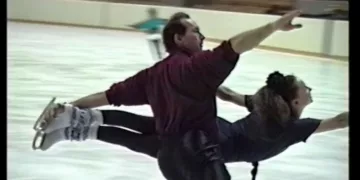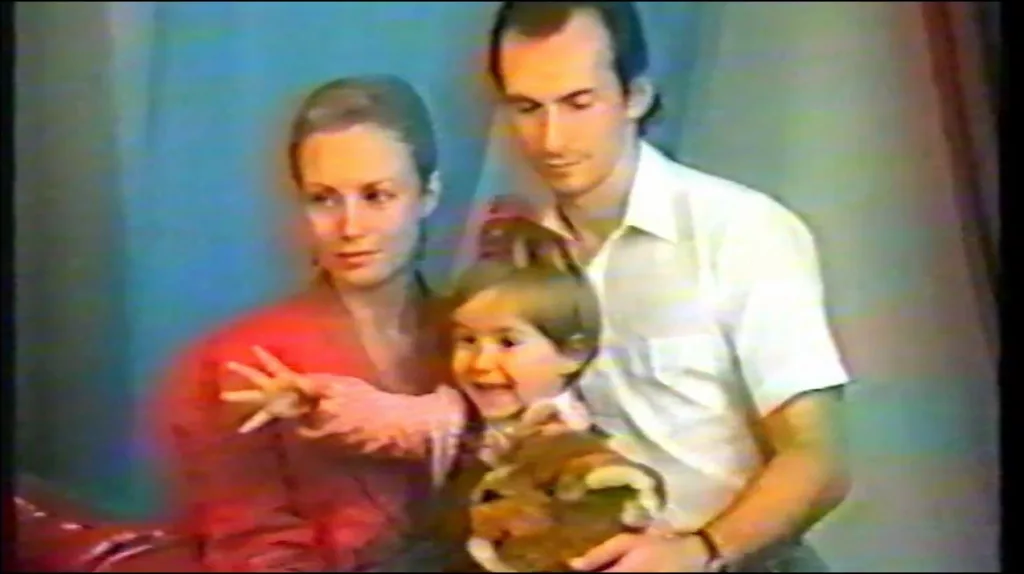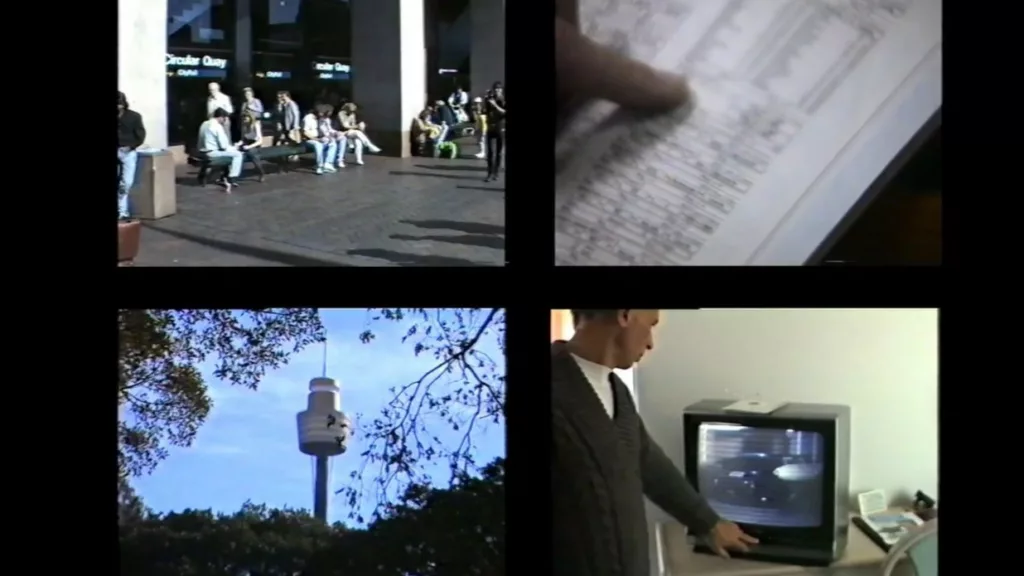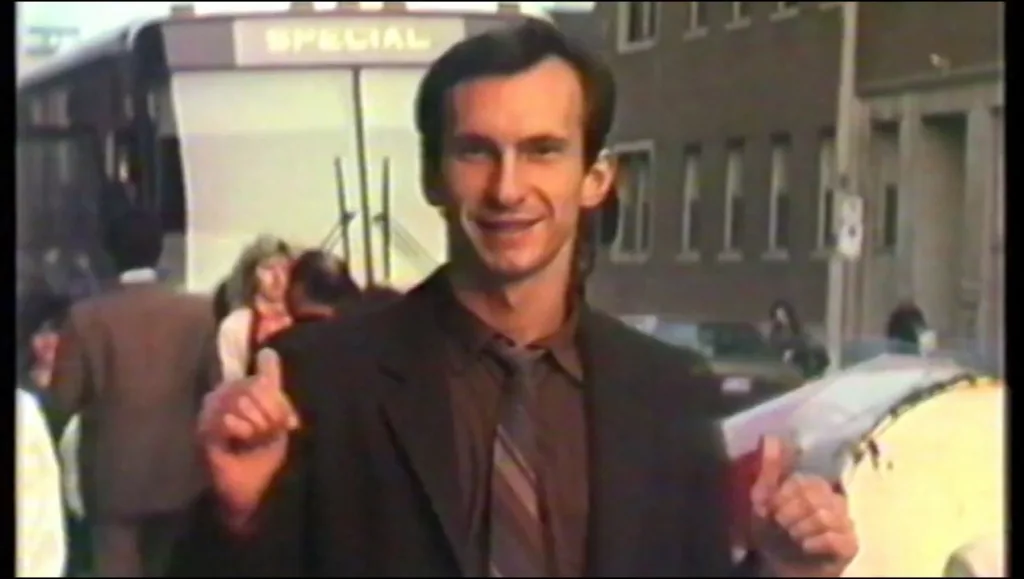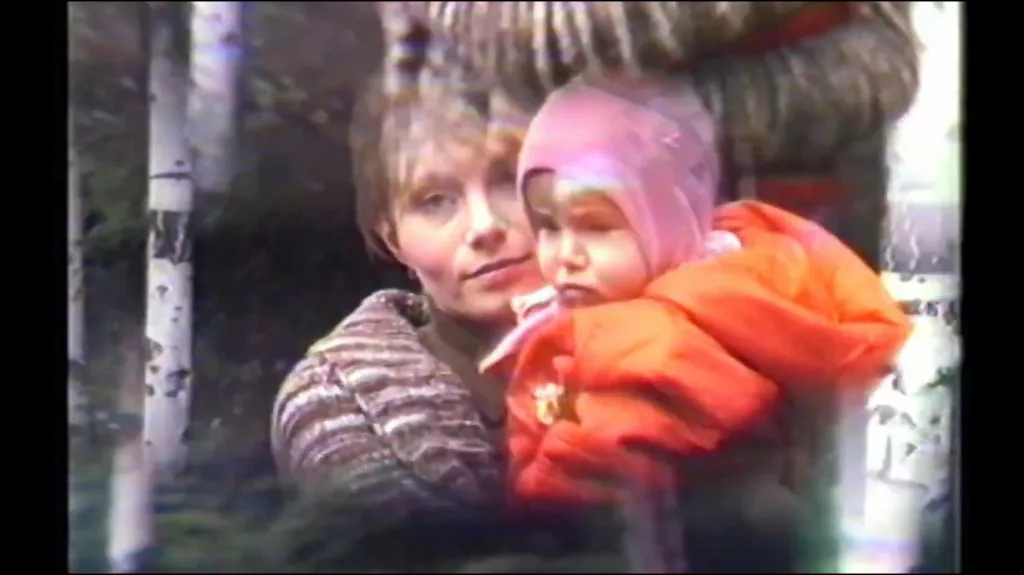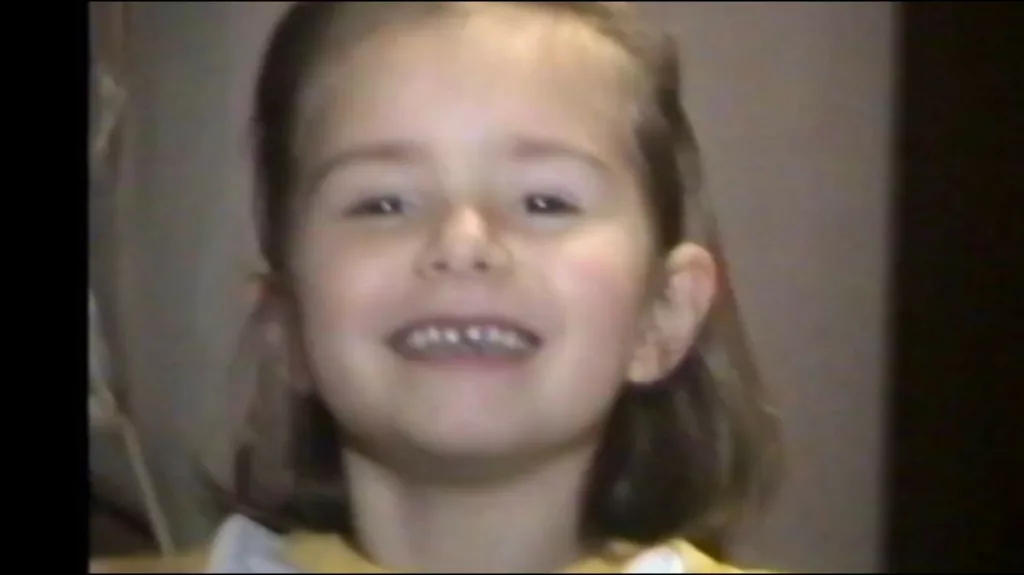Maria Stoianova was just a child in 1986 when her father received a video camera, kickstarting an unexpected hobby. Little did they know that the footage he captured over the next eight years would one day give Maria remarkable insight into her homeland’s tumultuous transition. Her feature film debut, Fragments of Ice, is composed entirely of these grainy home movies, charting her family’s travels as members of a Ukrainian ice ballet troupe against the dramatic backdrop of the Soviet Union’s collapse.
By day, Maria’s father, Misha, dazzled audiences around the world with his skating talents. But after hours, he turned his camera inward, preserving for posterity unguarded moments with Maria’s mother, Inna, and their young daughter. While performances in capitalist nations like Canada left Misha breathless, within the USSR, he saw little worth recording. These omissions speak volumes about the oppressive system he endured at home.
As the troupe rode the changing tides of history, Maria grew from toddler to schoolgirl before the lens. Looking back through childhood eyes, she guides us with a thoughtful narration blending recollection and research. Archives from the era illustrate how Ukrainian culture was subsumed under enforced “Russianness.” Yet Misha’s videos capture flickers of independence, from embracing Western consumerism abroad to dreams of owning their own home.
Today, Fragments of Ice offers a rarely seen perspective on Ukraine’s journey. Through one family’s intimate archives, we journey with them from Soviet constraint to an uncertain future. Maria’s thoughtful direction ensures her father’s simple home movies remain a poignant tribute to Ukrainian resilience and a backdrop to understanding her country’s place in the world.
Private Moments, Public Stories
Through grainy home videos spanning 1986 to 1994, director Maria Stoianova offers a vibrant glimpse into her family’s world. The footage, captured by her father Misha on trips abroad as a celebrated skater, preserves small private moments that also tell a sweeping story.
Misha’s videos document eight formative years for young Maria and her homeland. Born in 1986, the same year Misha acquired his first camcorder, Maria grew from baby to grade schooler before the lens. Meanwhile, Ukraine transitions from Soviet rule toward independence. Misha’s role touring abroad for the ice ballet troupe gave her a rare chance to see capitalist nations firsthand and record it all.
Through Misha’s lens, we join the family as they travel the globe, from Canada to Dubai. Fascinated by the contrasts to their homeland, he dutifully documents everything from shopping malls to TV shows. Yet the USSR receives no such coverage. This omission speaks volumes; within its borders, even exciting performances seemed dull. Autonomy abroad unleashed a new sense of possibility and wonder that they had little of at home.
Stoianova’s narration weaves her father’s memories into headlines and family photos, crafting a unique contextual tapestry. She acknowledges the privilege of their travels while also revealing hardships. Scenes inside their cramped Soviet apartment, filled with boxes as they hoped to buy more space, cut through romanticized notions. Independence brought challenges too, like their dream home showering cockroaches on moving day.
Through the intimate glimpses preserved in Fragments of Ice, private familial stories illuminate weighty public themes of national identity, history, and upheaval. Stoianova transforms snapshots from the edge of an era into a poignant reflection on her homeland’s passage into the present. In doing so, she shows how personal perspectives can offer stirring windows into the sweeping changes that shape nations and the world.
Cultural Cracks in the Façade
Fragments of Ice shares an intimate view of Ukraine transitioning from rigid Soviet control toward independent nationhood. Maria Stoianova’s deft work skillfully presents monumental historical shifts through her family’s small-framed experiences.
As part of Ukraine’s preeminent ice ballet troupe, father Misha had rare access abroad displaying state-sanctioned “Russian” culture. Yet traveling stirred new perspectives. Foreign skylines awed, whereas dreary USSR trips left indifferent memories. Misha soaked in Western comforts like shopping malls while colleagues sold Soviet song and dance. His videos preserved the wonder of escaping that system, if only briefly.
At home, cracks in the façade emerged. Apartment scenes gripped by housing struggles hinted at suppressed hardships. State propaganda touting Soviet prosperity rang hollow against real conditions. Underneath an enforced shared “Russian” identity too, Ukrainians retained their own vibrancy, persisting in dance and dress when possible.
In independence’s uncertainties, hopes collided with new hardships. dreamed-of home-showered cockroaches. Presenting Misha now as simply “Russian” abroad showed that disentangling old shackles proved complex. Identity shifts took time as the crumbled USSR’s ghosts lingered in memory.
Stoianova’s layered presentation skillfully balances her family’s intimate experiences against monumental socio-political transitions. In flickers of home movies and whispered recollections, she captures a nation emerging from totalitarianism’s smothering embrace to define its cultural heartbeat anew. Fragments of Ice is a poignant look at finding and refinding Ukrainian identity amid historical upheaval—and reminding that nations like people evolve slowly through resilience against change’s personal costs as much as its blessings.
Weaving Memory into Motion
Fragments of Ice makes ingenious use of found footage to craft its story. At the film’s heart lie home movies captured by Maria’s father, immediate glimpses into family life both humdrum and monumental.
Yet director Maria Stoianova surrounds these intimate scenes with other archives, juxtaposing private moments against broader political currents. State-sanctioned ballet videos recite stilted propaganda, starkly contrasting with the heartfelt celebration we see. Shifting aspect ratios seamlessly transport between eras—one moment a child’s curiosity, the next tanks invade Moscow.
Through such formalist maneuvers, Stoianova transforms dailiness into springboards for deeper reflection. A trip abroad offers not just vacation pleasures but revelation against the journey’s denied beginnings. A daughter’s first steps carry the future on their soles, and in choice cuts, we sense independence’s fragile genesis.
Simple too are techniques elevating emotive resonance. Freeze frames and stills lend gravity to reminiscence. Careful editing by the late Viktor Onysko, himself lost to violence, weaves narrative coherence from scattered reels. All the while, Anton Dehtiarov’s score drifts like a bittersweet sigh carried on winds of change.
What was once merely home movies becomes something more—a visual poem about how families withstand turmoil through resilience, humor, and love. In deftly creative hands, fragments thus assemble into a poignant whole, artfully animating memory on screen. Fragments of Ice proves how the personal can echo the political when framed through passionate artistry.
Journeys Within and Beyond Borders
Fragments of Ice delves deeply into Ukraine’s complex past by chronicling one family’s mobility between 1986 and 1994. Through their father’s career dancing abroad, glimpses of different worlds gradually emerge.
Misha eagerly documented travels to the West but avoided filming within the Soviet Union. His omission speaks volumes; what wasn’t captured hints at a stifling reality left unsaid. Abroad, wonder fills each new discovery; at home, a stark contrast lingers off-camera.
During tours, economic hopes blossom. Glimpses of malls, skyscrapers, and abundant goods stir dreams of capitalist comforts denied within the USSR. Yet, returning to the dreary boxes stacked in their apartment, reality sets back in. Independence stirring, illusions of the Soviet system fade, while private hardships stay shrouded.
Historical currents also flow beneath the family’s journeys. The Chernobyl disaster’s legacy echoes darkly. Independence stirs new uncertainties; will ambition meet disappointment? As the country changes, familiar tensions resurface. Squatters altering their new home reflect deeper struggles over national identity and sovereignty.
Connecting personal tales to wider transitions, Stoianova finds parallels between past and present challenges. Just as Ukraine shakes off one empire’s hold, new threats to its autonomy emerge. Her exploration navigates how individual and collective narratives intersect. Recurring resistance to outside pressure surfaces as a steady thread throughout.
With insight and care, Fragments of Ice weaves intimate portraits of a family into the tapestry of their nation’s history. Journeys within the camera’s frame reflect larger questions of what remains unseen yet felt. Mobility across real and imagined borders reveals how the personal illuminates the political across eras of Ukrainian life.
Weaving Memories amid Transition
Fragments of Ice boldly explore significant terrain, yet navigating such ranges proves taxing at times. Stoianova’s scope spans from personal to political; her father’s footage is woven with woven history and introspection. Such depth rightly aims to illuminate their nation’s complex journey.
However, voluminous details and divergent threads challenge consistent flow. Excess data risks saturating the mind and hampering emotional connection. Narration laboring through causal links and context loses some engagement.
Stoianova’s re-edit after Viktor’s loss also brought adjustments. His passing reminded me that realities evolve chaotically; nothing promises a conclusion. Life continues amid conflict, memories, and meaning reshaped even after curation. Her return to material signifies this fluidity and determination to glean significance from suffering.
Yet balance remains delicate. Information and experience must harmonize for audiences to feel rather than just learn. Stoianova’s skill draws from intimate textures, but messaging risks dilution when overwhelm sets in. Concision and aesthetic cohesion become allies for impact.
Despite unevenness, Fragments achieves poignant illumination at its best. The personal implications of epochal change emerge from ordinary yet extraordinary footage. Borders confronted illuminate intangibles, demarcating eras. Continuity amid disruption highlights human resilience.
By honoring complexity without taming it, Stoianova forges meaningful dialogue about her people’s lived realities. Her efforts merit praise for confronting history on its own challenging terms.
Fragmented Perspectives, Shared Humanity
Fragments of ice weave vital threads through the turbulent tapestry of Ukraine’s transition. By filtering history through familial footage, Stoianova grants intimate access to the personal impacts of political change.
What begins as a uniquely personal story evolves into a nuanced reflection on the challenges faced by countless people amid upheaval. Conflicting propaganda and reality, the struggle for autonomy amid external control, dashed hopes during instability—tthese ring tragically familiar for many navigating new nationalism.
Yet for all its complexities, the film maintains a focus on fundamental shared joys and bonds that transcend borders. Childlike wonder in new places, roots tied to parental care—these grounded the family amid fragmentation. Though perspectives proved limited and memories malleable, humanity shone through fractured frames.
While not able to fulfill every ambition, Fragments achieved meaningful historicization of individual experience. It reminds us that collective narratives form from accumulated visions, each deserving respect. By honoring how personal became political, it pays tribute to resilience bolstered by connection.
Ultimately, this documentary succeeds by steering discussion toward profound universalities. It reminds us that even as turmoil isolates, our shared capacity for love and curiosity can anchor hope. And it leaves viewers to ponder how we might build bridges through the chasms dividing both histories and homes. On this poignant note, Fragments emerges as a work of quiet contemplation for its time.
The Review
Fragments of Ice
Fragments of Ice offers a poignant glimpse into Ukraine's complex journey through turbulent change, filtering broad political upheaval through the intimate lens of one family's home videos. While at times struggling to balance scope and narrative flow, the documentary shines in cultivating thoughtful reflection on identity, memory, and the universal human experiences that transcend borders. Overall, Maria Stoianova has crafted a work of meaning that honors personal perspective and reminds us of our shared ability to find hope amid life's fragmentation.
PROS
- Provides an intimate view of Ukrainian history through personal archive footage
- Thoughtfully examines themes of national identity, memory, and the transition of power
- It evokes empathy by highlighting universal family connections and experiences
- Relevant to understanding Ukraine's ongoing cultural and geopolitical challenges
CONS
- Narrative flow is occasionally disrupted by an overload of historical context
- Lacks emotional depth at times due to a difficult balance of information
- Voiceover narration can be heavy and distracting compared to raw footage
